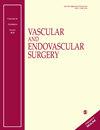Pharmacological Thromboprophylaxis for VTE Post-Endovenous Ablation of Varicose Veins: Network Meta-Analysis
IF 0.7
4区 医学
Q4 PERIPHERAL VASCULAR DISEASE
引用次数: 0
Abstract
ObjectiveEndovenous ablation has revolutionized treatment of varicose vein surgery but is associated with a risk of venous thromboembolism. There is no consensus regarding anticoagulation protocols for these patients. This network meta-analysis (NMA) aims to identify which anticoagulant is optimal in this cohort for clot prevention with minimal risk of adverse bleeding events.MethodsLibrary databases were searched for studies where patients were treated with one or more anticoagulants following endovenous ablation for varicose veins. The methodological quality of included studies was quantified using the Risk of Bias (ROB) assessment tools. Findings were reported using the meta-analysis of observational studies in epidemiology (MOOSE) checklist. Statistical analysis was carried out using metainsight (rpackage).ResultsObservational data on just under 1500 patients prescribed post ablation anticoagulation (Rivaroxaban, Enoxaparin, Fondaparinux) were analyzed. Patient characteristics were comparable across the cohorts. 81 thrombotic and 40 minor bleeding events occurred in total. Overall rivaroxaban is found to be superior to the other agents.ConclusionsThis NMA indicates that prophylactic rivaroxaban is the highest ranked anticoagulant for thromboprophylaxis in patients post endovenous ablation for varicose veins, with a low risk of adverse bleeding. The choice whether to anticoagulate these patients is likely to remain at the discretion of the treating clinician.静脉曲张静脉内消融术后 VTE 的药物血栓预防:网络元分析
目的静脉腔内消融术彻底改变了静脉曲张手术的治疗方法,但也存在静脉血栓栓塞的风险。关于这些患者的抗凝方案,目前尚未达成共识。本网络荟萃分析(NMA)旨在确定哪种抗凝剂是该人群预防血栓的最佳药物,同时将不良出血事件的风险降至最低。方法在图书馆数据库中检索了静脉曲张静脉内消融术后患者接受一种或多种抗凝剂治疗的研究。采用偏倚风险(ROB)评估工具对纳入研究的方法学质量进行量化。研究结果采用流行病学观察性研究荟萃分析(MOOSE)核对表进行报告。使用 metainsight (rpackage) 进行了统计分析。结果分析了不到 1500 例消融术后抗凝治疗(利伐沙班、依诺肝素、磺达肝癸)患者的观察数据。各组患者的特征具有可比性。共发生了 81 起血栓事件和 40 起轻微出血事件。结论 该 NMA 表明,对于静脉曲张静脉腔内消融术后患者的血栓预防,预防性利伐沙班是排名最高的抗凝药物,且不良出血风险较低。是否对这些患者进行抗凝治疗可能仍需由临床医生自行决定。
本文章由计算机程序翻译,如有差异,请以英文原文为准。
求助全文
约1分钟内获得全文
求助全文
来源期刊

Vascular and Endovascular Surgery
SURGERY-PERIPHERAL VASCULAR DISEASE
CiteScore
1.70
自引率
11.10%
发文量
132
审稿时长
4-8 weeks
期刊介绍:
Vascular and Endovascular Surgery (VES) is a peer-reviewed journal that publishes information to guide vascular specialists in endovascular, surgical, and medical treatment of vascular disease. VES contains original scientific articles on vascular intervention, including new endovascular therapies for peripheral artery, aneurysm, carotid, and venous conditions. This journal is a member of the Committee on Publication Ethics (COPE).
 求助内容:
求助内容: 应助结果提醒方式:
应助结果提醒方式:


